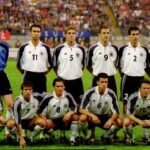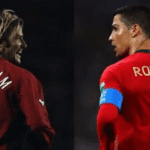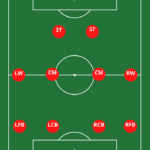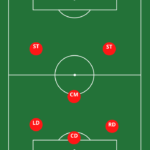- Last Updated -
Introduction: The Beautiful Game’s Grandest Stage
Let’s explore Brazilian Soccer in the World Cup… The World Cup, a grand tournament that encapsulates the spirit of international competitiveness and camaraderie, is an event that unites nations worldwide every four years. It is an emblematic symbol of soccer’s global appeal, with over 200 nations vying for a place among the world’s footballing elites to compete in this prestigious tournament.
Since its inception in 1930 by FIFA—the international governing body for football—the World Cup has transformed into a spectacle that is characterized by stirring triumphs, heart-wrenching defeats, and unforgettable moments etched indelibly into the annals of sports history.
It attracts an enormous global audience unmatched by any other sporting event, transcending borders and cultural divides to unite people around their shared love for ‘the beautiful game’.
This global event provides a stage for the world’s best players to prove their mettle and write their names in golden letters in football history. The thrill, tension, exhilaration—every emotion reaches its zenith when players don their national colors at this most prestigious platform where legends are born and histories are made.
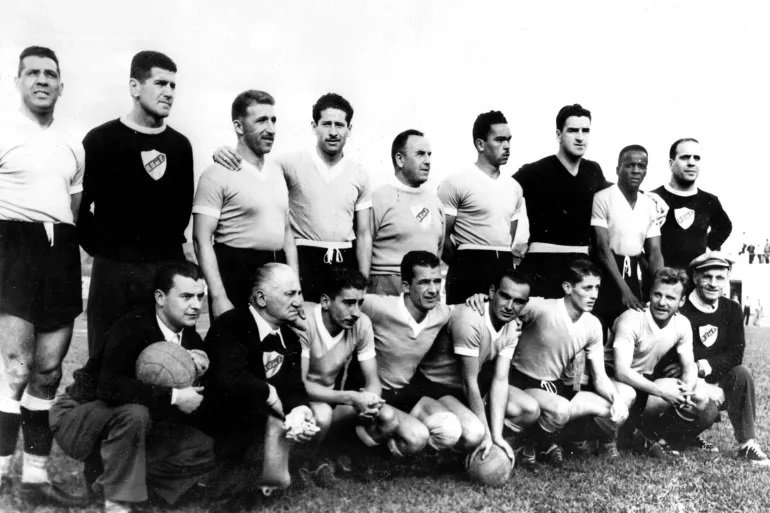
Brazil’s Arrival on World Stage: A Journey Rooted in Passion and Prowess
With five championships under its belt—and several more near misses—Brazil holds firm as one of the most successful nations ever to grace the World Cup stage. This South American powerhouse first participated in the inaugural 1930 tournament held in Uruguay but failed to make a significant impact.
However, these humble beginnings set Brazil on a path where soccer would come not just to dominate its sporting culture but also become deeply interwoven with its national identity.
Brazil’s evolution as a globally dominant force began earnestly during the Second World War period when it reached its first final in 1950 on home soil—an event so heavily impactful that it led to widespread changes both within Brazilian soccer structures and the national psyche which still echo today.
An analysis of Brazil’s journey cannot be complete without mentioning illustrious players who have donned the yellow jersey—Zizinho from early days; Pelé—the only player with three World Cups; Garrincha—who mesmerized with his dribbling skills; Zico—with his technical brilliance; Ronaldo—the second-highest goal scorer at World Cups; Ronaldinho—for his tricks and magical touches; or Neymar—a modern great.
Each generation has seen players who not only shaped Brazil’s performances but also left indelible imprints on the global football arena.

The Genesis of Glory: Early History of Brazilian Soccer
The early twentieth century was a time of transformation for Brazil. Newly urbanized and industrialized, the country was undergoing significant changes in its economic and social landscape. The city streets were filled with chatter about politics, arts, and the new sport that was taking the country by storm – football.
Much like samba, which found its rhythm in the heartbeats of Brazilians, football too began to echo in every corner of Brazil by the 1920s. It wasn’t long before this fervor translated into the establishment of numerous clubs across the nation.
From Fluminense and Botafogo in Rio de Janeiro to Palmeiras and Corinthians in São Paulo, clubs sprouted across cities providing a platform for talent to flourish. These were not just organizations but institutions that carried the dreams and aspirations of millions.
Yet these were still nascent times compared to what awaited Brazilian soccer on an international stage. Every great story needs its heroes, every epic its warriors; Brazilian soccer was no different as it stepped onto the global platform showcasing some extraordinary players whose influence continues today.

Stepping onto The Global Pitch: Brazil’s First Participation in The World Cup (1930-1950)
Brazil’s first tryst with World Cup came in 1930 when they were invited to participate along with twelve other countries at Uruguay’s capital city Montevideo.
But this debut wasn’t without its difficulties – from selection issues to lackluster performances – Brazil fell short on that grand stage putting forth an unsatisfactory performance by bowing out from their first two World Cups without winning any match. Despite initial hiccups, those years laid down crucial foundations for what would become a perennial powerhouse in world football history.
Owing greatly to managers who understood the importance of nurturing homegrown talent as well as incorporating strategic nuances into their gameplay.
From Preguinho who scored Brazil’s first-ever goal at a World Cup tournament during their debut match against Yugoslavia, to Leonidas da Silva also known as ‘the Black Diamond’ whose acrobatic style earned him accolades worldwide; these players marked their presence indelibly on international turf setting precedents for generations to come.
Finding Their Footing: Key Players And Performances
With each successive tournament came improved performances largely credited to key players who emerged during this epoch. These early luminaries lit up Brazilian football with such brilliance that they continue shining through decades past their retirement.
Domingos da Guia stands out among them; touted as one of the best defenders not only for his exceptional defensive abilities but also his innovative approach towards playing from the backline helped redefine modern defensive tactics making him an integral part during his early days ensuring Brazil’s progression into later stages at 1938 World Cup France.
Jair Rosa Pinto was another standout figure whose resplendent skill set combined with remarkable intelligence made him an invaluable asset;
especially visible during the 1950 World Cup where he played a pivotal role in helping the team reach the finals leading the crowd into a frenzy chanting “O Brasil joga como nunca e perde como sempre” which translates loosely into “Brazil plays like never before but loses as always” hinting assertion towards better performance despite unfortunate loss against Uruguay famously known as ‘Maracanazo’ tragedy.

The Emergence Of Titan: Challenges And Achievements
The road towards greatness is often paved with adversities and challenges; it pushes you beyond your limits allowing you to discover your true potential within an abyss unknown previously; same applied for Brazilian soccer’s progression towards becoming a titan among giants worldly recognized today.
Brazil had yet not tasted victory till mid-twentieth century despite being blessed immensely talented individuals – this can partly be attributed due lack structured management system or comprehensive training regime following conventional norms prevalent those times across other European counterparts resulting inconsistent performances hampering potential progress.
Especially noticeable during initial years world cup participations dreadful losses caused widespread disappointment among citizens causing people question credibility team representing nation proud heritage culture deeply embedded within societal fabric eventually leading re-evaluation strategies.
Effectively implemented ensuing decades paving path unprecedented success soon follow thereafter resulting monumental shift overall perception regarding capabilities eventually establishing them undisputed leaders game adored loved millions worldwide making them synonymous word ‘Football’ itself destined etch name golden letters annals global sports history forevermore.
No doubt there were fleeting moments of success in earlier tournaments owing individual brilliance performers mentioned above.
Additionally many unknown unsung heroes contributed significantly towards the initial growth development of sport nationwide however, crowning glory still eluded them until the iconic 1958 triumph over Sweden sparked an era of dominance in unparalleled proportions catapulting them top echelons of international football.

The Golden Era: Pele and Garrincha (1958-1970)
Unveiling the Legends: Pele and Garrincha
Pele, born Edson Arantes do Nascimento, known widely as the ‘King of Football’, graced Brazilian soccer with his commendable skills between 1958 and 1970. A prodigious talent who incandescently shone on the world stage, Pele’s contribution to Brazilian football is nothing short of extraordinary.
His career included three World Cup championships (1958, 1962, 1970), a feat that remains unbeaten. Garrincha, moniker for Manuel Francisco dos Santos, was another tour de force in Brazilian soccer during this period.
Often considered Pele’s equal in technical ability and prowess on the pitch, Garrincha was a magician with the ball. The combination of these two titans showcased a time when Brazilian football truly dominated global soccer.
The Impact of Legends and Brazilian Soccer in the World Cup
The magnitude of their impact extended beyond goals scored or matches won; they defined an era growing into symbols of national pride and global admiration.
The 1958 World Cup witnessed a young Pele score six goals guiding Brazil to their first championship win while Garrincha’s dazzling dribbling skills during the 1962 World Cup steered Brazil to victory despite Pele’s injury.
Their performance in the subsequent tournaments further established Brazil as a dominant force in world football. Specifically noteworthy is Brazil’s triumph at Mexico ’70 where they won every game en route to lifting their third trophy—an achievement yet unmatched.
An Era Defined by Dominance
Brazil’s dominance during this golden era can be attributed not only to individual brilliance but also collective ingenuity. Their unique style—Samba football—coupled with tactical advancements like overlapping full-backs laid down by coaches like Vicente Feola and Mario Zagallo revolutionized how soccer was played globally.

Transition Period: Zico, Socrates, and Falcao (1974-1986)
A New Wave: Zico, Socrates & Falcao
The following years were marked by another set of legendary figures – Zico an exemplary playmaker whose free-kicks were feared worldwide; Socrates – an intellectual powerhouse both on and off the field; Falcao – one of history’s greatest midfielders.
Contributions & Highlights
Each player provided crucial contributions during their career span which led Brazil maintaining much-needed momentum after its golden age had phased out. Notably, Zico’s memorable performance for Brazil came in Spain ’82 where he scored four goals assisting his team to reach quarterfinals against all odds.
Similarly, Socrates’ captaincy helped maintain cohesion within the team resulting in dramatic victories such as against USSR in Spain ’82 while Falcao’s goal-scoring ability was a key highlight at the same tournament making him one of the top scorers for Brazil.
Brazilian Performance During Transition
Despite not winning any world cup trophies during this phase it must be understood that the Brazilian team still maintained its stature as one of the top teams globally owing much credit to enchanting skills exhibited on the field by the players aforementioned resulting in memorable performances that are cherished till date.

Modern Era Dominance (1994-Present)
A Modern Dance With Dominance
The modern era has seen continued success for Brazilian soccer largely due to emergence of phenomenal talents Ronaldo Nazario de Lima (‘Fenomeno’), Ronaldinho Gaucho – Ballon d’Or winner who mesmerized entire globe with his samba style; Kaka – last player apart from Lionel Messi & Cristiano Ronaldo winning FIFA Best Player Award; Neymar Jr – currently among highest paid players worldwide having scored second highest goals for country behind only Pele himself.
Continuing tradition these stars kept the flame alive resulting in tremendous victories most notably being USA ’94 where Ronaldo debuted followed later by a triumph at Korea-Japan ‘02 wherein Ronaldo emerged as the top scorer helping claim the fifth World Cup title for the country.
Their unique styles have carried forward the legacy left behind thereby contributing significantly towards dominance maintained through decades.
Influence Of The Brazilian Style Globally
The influence imparted upon global soccer tactics owing uniquely rich heritage possessed by Brazilians stands unparalleled. Fluid flexibility combined with creativity improvisation has made ‘Samba Soccer’ brand recognised globally inspiring countless aspiring athletes.
Moreover, the emphasis laid down on development programs within the country has resulted in production lines churning out talented players perpetually thereby maintaining dominance over the years.
As we conclude our journey from inception till present times we can safely say that influence exerted upon sport through consistent performances coupled with exhilarating display skills over decades has resulted in etching the name “Brazil” synonymous word “football” within the hearts of millions around the globe leaving us hopeful more breath-taking performances future tournaments would keep the spirit alive!
Introduction: Demystifying a Controversial Issue Soccer is a sport that requires specific...
Read MoreThe Historical Dominance of Brazilian Soccer in the World Cup
Introduction: The Beautiful Game's Grandest Stage The World Cup, a grand tournament...
Read More



